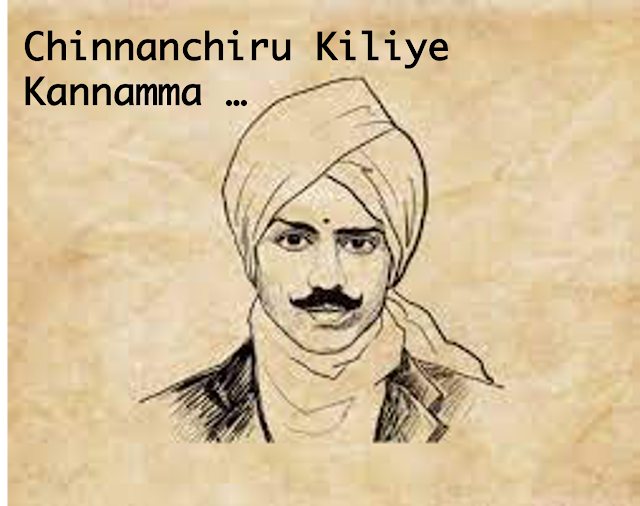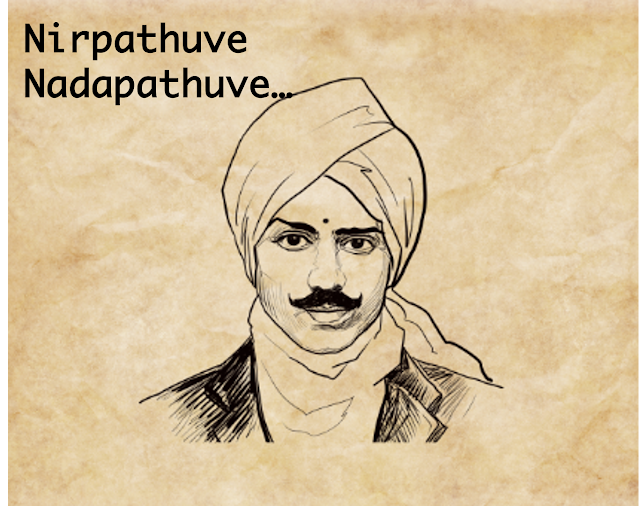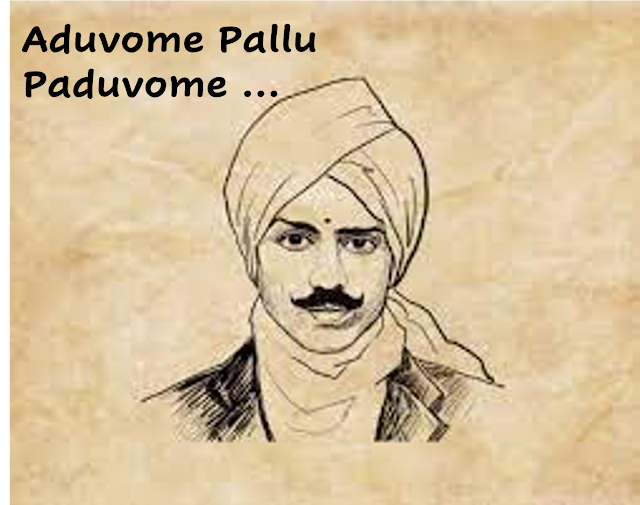COLLECTION OF BHARATHIYAR SONGS
Subramanya Bharathiyar is a renowned poet from Southern India. He composed poems and songs in the Dravidian language Tamil, which have gained popularity in schools, movies, and households across India over the years. HIs poetry is known for its appeal to the liberty and strength of the people.
As a person, Bharathiyar was a simple man, interested in his writing alone. His wife would leave the house to bring food somehow, while he wrote and brought in little income for the poor family. However, his writings have earned him the title "Mahakavi", or "Great Poet".
Born to Chinnaswaamy Aiyyar and Lakshmi Ammaal in 1882 at Ettaayapuram, he lost his mother at 5, and at 11 was invited to a conference of Ettayapuram court poets and musicians. There he was given the title Bharathi for this ability to compose poems and songs - he accepted a challenge and composed a cindu on the model of kaavadi cindu of Annamalai Reddiyaar. At 15 he married Cellammaal and 1898, his father died.
At 22, he became Tamil teacher at Setupati High School in Madurai and the same year was appointed Assistant Editor of a daily newspaper called "Swadesamitran". In 1906, he was editor of a weekly magazine called "India" in Madras and the next year a friend of his, Krishnaswaamy Aiyyar received from him songs he had composed on patriotism and published them, titled "Sudesa geetangal". In 1908 the government wanted to arrest him, but he escaped to Pondicherry (under French rule) and published "India" from there. In 1912 he translated the Bhagavad Gita into Tamil and composed songs on Krishna, "Kuyil" and "Panchaali Shabadam" (on Draupadi of the Mahaabhaarata). When he left Pondicherry in 1918, he was arrested and later released.
His national integration songs earned him the title "Desiya Kavi" (National Poet). He composed Tamil Keertanais on love, devotion, fearlessness, mysticism, His stepbrother C. Vishwanaata Aiyaar and V.V.S. Aiyyar tell us that he himself set his songs to music and could sing them well in a variety of raagams. In "Bharata Deviyin tiru dasanga," he used 10 raagams. His patriotic songs emphasize nationalism, unity of India, equality of man and the greatness of the Tamil language, set himself to folk tunes. He sang these himself at Congress meetings at the Madras beach.
In an article " Sangeeta Vishayam" (Issues in Music), Bhaarathiyaar rebukes musicians for singing songs of the Trinity, Patnam Subramania Aiyaar and others without knowing the meaning because the songs are all in Sanskrit or Telugu. Without knowing the meaning, singers are unable to sing with proper expression. He also says songs usually portray devotion and love and not other emotions like courage, anger, wonder, fear and hatred. He emphasized that musicians should not sing songs which they don't understand and should learn from Hindustani musicians how to train their voices.
When he fed a coconut to Lavanya (the elephant), the elephant attacked Bharathi. Although he survived the incident, his health deteriorated a few months later and he died early morning on 11 September 1921 at around 1 am.
He has lived only 39 years of short life, but Subramaniya Bharathi left behind a big mark as a poet of Tamil nationalism and Indian sovereignty.
- Chinnanchiru Kiliye kannamma
- Enakku Vendum
- Oli Padaitha Kanninai Vaa vaa vaa
- yathumagi nindrai, Kali
- suttum Vizhi Chudar dhaan
- Kakkai Siraginile Nandalala
- Nirpathuve Nadapathuve
- Nallathor Veenai Seithe
- Agni Kunjondru Kanden
- Keladaa Manida
- Senthamizh Nadenum Pothinilae
- Achamillai Achamillai
- Paarukule Nalla Naadu
- Aduvome Pallu Paduvome
- Kannamma En Kadhali
- Yethanai Kodi Inbam Vaithay
- Kannamavin Kadhal
- Mohathai Kondru Vidu
- Vellai Thamarai Poovil Iruppal
- Endru Thaniyum Intha Suthanthira Thagam
- Engirunthu Varuguvatho
- Vellai Nirathoru Poonai
- Poottai Thirappathu Kaiyale









































0 Comments